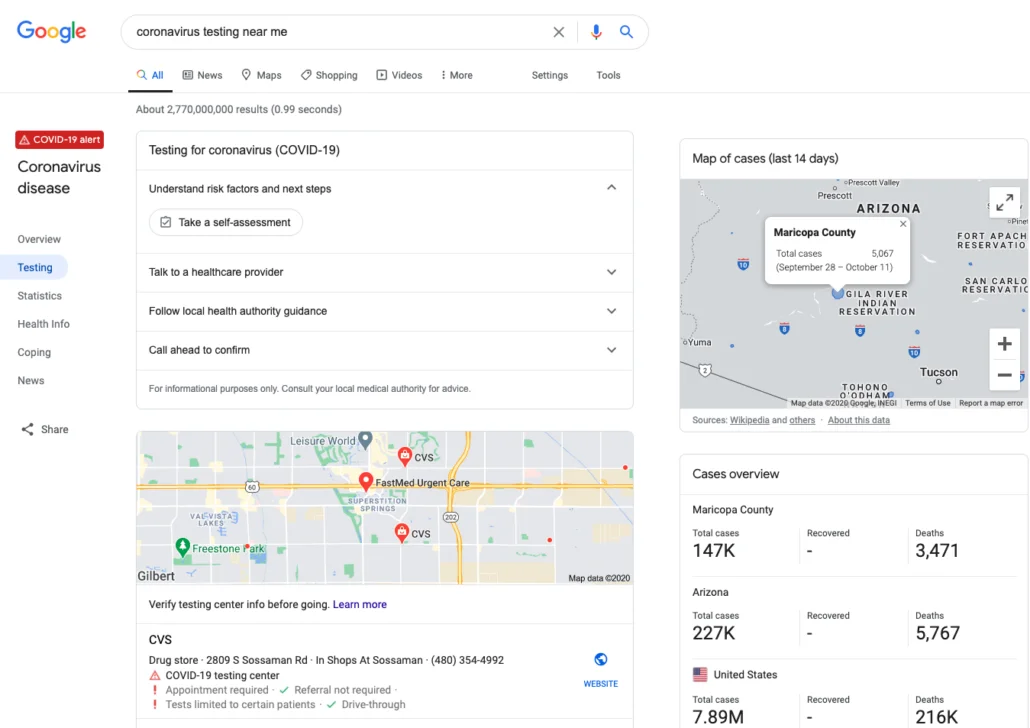Late last week a shop owner sent me a text, “You available for a quick chat? An employee tested positive for COVID.”
Queue the dramatic freak out music.
It is very easy to see multiple challenges ahead for this business in the near future. Just when things were starting to get back on track too.
So I spoke with this person about the situation and learned that this employee wasn’t feeling well, and went to see a doctor. They administered the test, and it came back positive for COVID-19. The business owner immediately contacted all of the company staff and had them tested as well.
Another employee tested positive for COVID.
As he only had a staff of ten, that’s 20% of his workforce. We discussed options for how to handle the situation with the other employees, customers, orders on the schedule, and other ideas.
After that call, I started asking others about this type of situation and learned that several companies that I speak to on a regular basis have had employees go through this recently as well. All of them had to work their way through the challenge. As this is a private matter, not a lot of people know that a business they are associated with in this industry could have been struggling with this challenge.
So I thought it might be a good idea to write a general tip sheet on what to do if you are facing this COVID-19 situation in your business.
First, Get Everyone COVID Tested
As every employee works differently in your business, you need to chart out the impact this may have.
Your employees will need to get tested. If you don’t already know where the nearest testing facility is, you can easily find one just by simply typing in “coronavirus testing near me” into the search bar on Google. A map with locations and options will appear.

In some areas, the testing is being offered for free. Drive through testing may be available. If in your area you are charged for the test, it is covered by the Families First Coronavirus Response Act.
Contact your employees immediately and let them know the COVID-19 situation.
Before they could possibly infect other people they need to know their status. They need to get urgently tested. Remind them to wear a mask. Give them details of where they should go.
Have them inform you of the results so you can create an action plan on how your business is going to navigate through this crisis.
Secondly, Assess The Situation And Act
When you have all of the facts regarding who and how many of your employees will need to be isolated, the next step is to assess the situation and make an action plan.
Who will be in isolation and quarantine and what were their main responsibilities? Could they work from home? Will you need to get coverage for their duties by shifting other staff members into their roles temporarily?
Will your production schedule or other task oriented work be affected in the shop?
Was the employee customer facing? Did they come in contact with others in your shop, such as the UPS driver or a visiting industry salesperson? You may need to inform others about the situation. Do so quickly, so they can get tested too.
Think through this COVID challenge calmly, and write down tasks and make a to-do list.
Prioritize and delegate.
Thirdly, Review Your Hygiene, Protocols, and Training
As we collectively make our way through this pandemic era, it has easy to start thinking that “it can’t happen to me” as another day goes by without a COVID incident.
For the shop owner that called me, this was almost their mindset. They didn’t wear masks while working and everything was almost business as usual before the pandemic struck.
They were just busy churning out work.
Now, they have several employees out in isolation and they’ve had to close the shop for a few days. That brings the need for more action for hygiene, protocols, and safety rules into focus.
How are these ideas working in your shop? Have you gone a little lax recently? Are you as safe as you can make it?
Here are some things you can do right now:
- Develop, implement, and train on COVID-19 prevention protocols for your shop.
- Keep 6′ apart with social distancing.
- Wear masks.
- Thoroughly wash your hands frequently throughout the day with soap and water for at least 20 seconds.
- Use hand sanitizer stations throughout the building. Encourage their use.
- Clean with products made to kill the Coronavirus. Anything and everything that people touch. Light switches, doorknobs, railing, keyboards, handles, equipment, etc. Do this frequently during the day.
- Have a plan for when an employee is infected with the coronavirus.
- Talk to your employees often. Be transparent and share COVID information. Communication makes things less scary.
Let’s Talk About Washing Hands
Not everyone washes their hands or uses hand sanitizer, and it is maybe unclear about when to do it. Here is an easy list to consider:
- After you blow your nose, cough, or sneeze.
- Before, during, and after preparing food.
- After using the toilet.
- The next thing you do after touching garbage.
- Before you start work.
- After you work, before you leave.
- Before and after work breaks.
- After touching objects that have been handled by customers or other employees.
Fourth, Lead With Empathy
Nobody wants to get COVID. And while statistically speaking, the mortality rate is low, it is still a health condition that is a real challenge to suffer through.
For people in isolation, they need to hear from you. Check in on them. Let them know you are thinking of them, and wish them well.
Ask, “What do you need?”
Empathy and compassion are traits that make us human. Your staff that has to isolate would rather be anywhere else than home enduring the coronavirus symptoms.
And Yes, As Their Employer You Need To Pay Them
As stated in the Families First Coronavirus Response Act, your staff that has to isolate is covered for paid sick time. You should read this regulation and understand how this can affect your business.
You should also note that the FFCRA has provisions for employees to take leave at two-thirds pay to care for a family member or sick child.
The FFCRA mandates that 100% tax credits are available to you for reimbursing you for paying your employees to stay home up to December 31, 2020. This was created so you or your employees don’t have to decide between keeping everyone safe and healthy and getting a paycheck.
Send them home.
Getting Back on Track
When one or more of your staff members is going to be out for a length of time to recover or quarantine from COVID, this situation will naturally disrupt things in your business.
Depending on the severity of the symptoms, they could work from home while they are in isolation if their job could be performed there. Art, sales, purchasing, accounting, and other front office-type duties could conceivably be handled outside of the office. Maybe that is something you could help them get set up, if they are agreeable.
However, many tasks can’t be handled outside of the shop. This means you need to redeploy other staff members to handle these tasks. Hopefully, you already have a crew that is cross trained.
If not, plan on the work performed to be slower than usual. There could be some mistakes or quality issues too. Go slow.
Don’t add to the stress by jumping on your crew if they make a mistake, as they are trying their best. Work through the situation with patience and understanding.
The last thing you need is to blow up about something and then have an employee quit and further decimate your staff. Recognize that this is a stressful and unusual situation. Help them understand what is needed and lead with clarity.
Some thoughts that may help:
- Determine what might be achievable with a limited crew. This may mean you are down 50% or so until you are at full-strength with your team.
- Think about outsourcing. Are there options available to you? Besides contract decorators, this could also mean outsourced art, marketing, or even bringing in temporary workers.
- You may need overtime to get back on track. Keep your customers happy.
- Be transparent with your customers. Let them know early what is going on, the precautions you are taking, and how this may affect their orders. Plan ahead.
- When scheduling, one idea is to have a day on the schedule to simply “catch up”. The new work is scheduled after this date. This hole in the schedule is a natural expansion joint that can be used to get back on track.
- Double down on COVID cleaning protocols. Take stock of what you are currently doing to prevent the spread of the disease. Is it enough? Rotate this duty with your staff. Use a checklist on what to clean.
- Use visual cues as to what is 6′ apart. Move workstations, desks, break room tables, chairs, or other items that people use to make it easy to do the right thing.
- Recommend that visitors wear face coverings while in the building. Post signs. Provide them if they do not have one.
People Need To Hear From You
This is a time for communication. Constant, accurate, and informative dialog goes a long way.
Don’t assume people know what or how to do something. This isn’t a situation that we’ve ever been through. Even if you thought that it couldn’t happen to you or your shop, it may.
It is never too late to change or do the right thing.
The problem with not communicating is that people make up their own stories in their heads about what is going on. You want everyone on the same page, and the only way to do that is with conversations and written COVID-19 policies or procedures.
Like you, I wish that this situation would go away soon.
But until then, being prepared, vigilant, informed, and forthright about the situation is the best way forward.
COVID Resources That May Help
Lead Your Business Through the Coronavirus Crisis – Harvard Business Review
Coronavirus Disease (COVID-19) Pandemic – World Health Organization
COVID-19 Prepare Now For A Possible Re-Emergence – SHRM
4 Things All Employers Should Do To Prepare for the Coronavirus – Roetzel Law
Planning For The Coronavirus: A Necessary Business Exercise – Barley Snyder
COVID-19 Frequently Asked Questions – CDC
Department of Labor Guidance on Unemployment Insurance Flexibilities – DOL
Families First Coronavirus Response Act – DOL
“Carry out random acts of kindness, with no expectation of reward, safe in the knowledge that one day someone might do the same for you.” – Princess Diana
“Healing is a matter of time, but it is also sometimes a matter of opportunity.” – Hippocrates
“From caring comes courage.” – Lao Tzu





